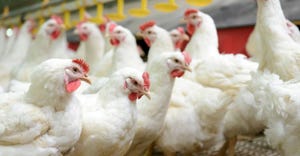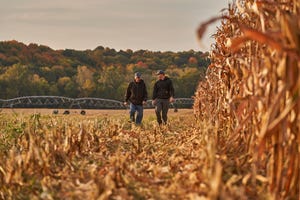Genome sequence promises to be valuable platform for advances in studies of traits of biological and agronomic importance in forage crops.
November 30, 2015

The Genome Analysis Centre (TGAC) in collaboration with the Institute of Biological, Environmental & Rural Sciences (IBERS) at Aberystwyth University, has sequenced and assembled the DNA of red clover to help breeders improve the beneficial traits of this important forage crop. The genome is published in Scientific Reports, a journal from the Nature publishing group.
Before industrial nitrogen fertilizer production, red clover and other legume crops were essential in crop rotation for improving soil fertility. Legumes boost soil nitrate fertility by assimilating nitrogen from the air, recruiting soil bacteria to help — this is considerably more eco-friendly than the equivalent industrial process.
Indeed, environmental concerns and climate change mitigation is putting red clover back in the spotlight. This requires genetic improvements to help boost its performance.
Besides soil improvement, among red clover's chief benefits are to provide a protein-rich livestock feed and to boost omega-3 fatty acids in ruminant milk. Compared to white clover and other legumes, red clover has high levels of an enzyme that causes its' protein to be digested more slowly and effectively by ruminants, TGAC said.
However, currently, red clover only grows well for two or three seasons, and it does not recover well from grazing by livestock. It also does not lend itself easily to traditional crop breeding practices, with severe loss of vigor and fertility if inbred.
An ongoing project at TGAC and IBERS aims to use a collection of diverse natural lines of red clover for breeding new elite varieties more tolerant to grazing, thus making it more persistent, and to understand the domestication process that led to the adoption of red clover as a crop.
For the breeders, this draft genome provides a welcome tool, with which to speed up incorporation of traits that are beneficial for the use of red clover in sustainable agriculture from natural populations of red clover plants sampled from all over Europe. Widening of the genetic diversity of the breeding populations will help to make red clover a more robust and reliable crop.
Therefore, the genome sequence promises to be a valuable platform for advances in studies of traits of biological and agronomic importance in forage crops.
Lead author Jose de Vega, a TGAC researcher, said, "The publication of the red clover reference genome is an important milestone, as it represents the first genome sequence of the clover forage crops, which are key components of more sustainable livestock agriculture.
"The availability of the genome assembly will pave the way towards genomics-assisted breeding methods for forage legumes, and provide a platform for deeper understanding of the genetics of forage crop domestication," he added.
You May Also Like



